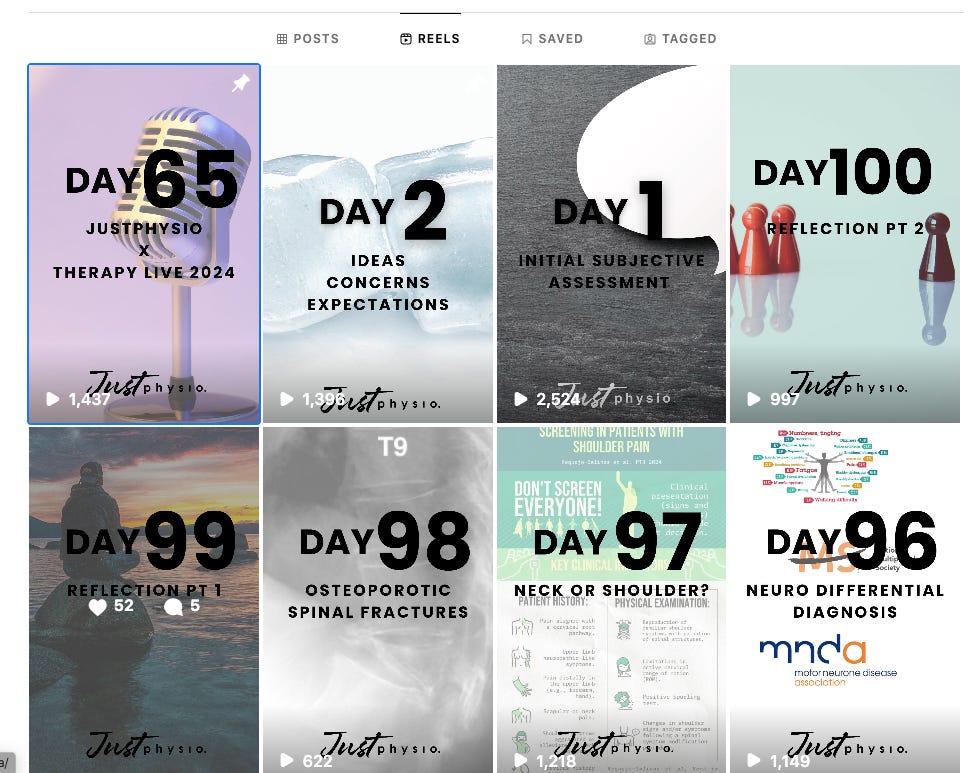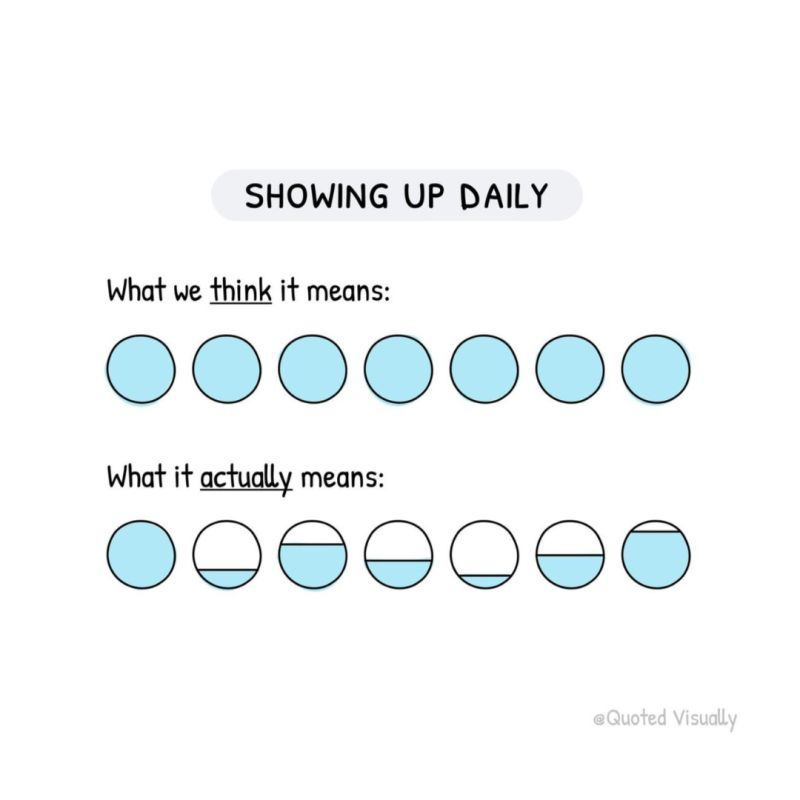Reflecting on 100 Days of MSK Posts: What I Learned About Physiotherapy, Consistency, and Myself
Thanks for reading the 13th edition of my newsletter. This newsletter tracks my work to create the best available resource for newly qualified physiotherapists interested in MSK.
20th February 2024 - I posted my first video on Instagram, diving into a 100-day challenge to become a better MSK physio. My aim was straightforward: learn by teaching. Share what I know, and, hopefully, build a community of learners and enthusiasts along the way.
24th October 2024 - After countless retakes, edits, and 100 posts, I’ve reached the finish line of this challenge.
And as I look back, I realize that these past few months have taught me so much more than just clinical knowledge. I've gained insights into the art of physiotherapy, and the strength of consistency, and even uncovered more about myself as both a professional and an individual.
Lesson 1: The Art of Showing Your Work
Early in this journey, I stumbled upon the book Show Your Work by Austin Kleon, and its message truly resonated. Kleon argues that sharing your process—not just the finished product—is invaluable, especially for beginners looking to connect and learn from others. Initially, I hesitated. Was my work good enough? Was I “expert” enough to post?
Yet, I soon discovered a liberating truth: you don’t need to be an expert to share your insights. Beginners can absolutely help other beginners. By documenting and explaining MSK concepts online, I forced myself to research thoroughly, ensuring accuracy and clarity in what I shared. This process of “learning through teaching” is something Richard Feynman famously advocated. Feynman believed that if you can simplify and distill a concept enough to teach it, then you truly understand it. Through this journey, I found that breaking down complex ideas not only helped my followers but strengthened my understanding.
Lesson 2: Learning from the Giants in Different Fields
One unexpected lesson was just how much I learned from people outside of physiotherapy. Creating content every day brought me into contact with experts in video editing, photography, and online engagement—fields I’d never thought I’d explore. Watching others in these fields excel made me question: Why did they make it look so effortless?
This led me to a crucial realization. Effortless work is often the result of relentless effort. In a speech, Roger Federer once said, “I had to work very hard to make it look easy.” This resonated deeply with me. The professionals who make their craft seem simple do so by honing their skills over countless hours. Their ease wasn’t a result of pure talent alone; it was hard work, refinement, and practice. Eric Meira echoed a similar sentiment in Simple is Hard, where he emphasized that clarity comes from knowing the “what, when, why, where, and how” of a subject. To master any craft, we need to understand it deeply, and when we do, simplicity follows naturally.
So, here’s a reminder: don’t undervalue something just because it has become simple for you. Doing the simple things well is, itself, an art.
Lesson 3: Redefining the Role of a Physiotherapist
As I continued posting and learning, I found myself questioning my own perceptions of physiotherapy. Early in my career, I had this idealistic view that physiotherapy could “fix” pain and heal conditions in a straightforward way. I’d probably bought into some of the same myths that float around about physiotherapy.
But the reality is different. We can’t always “heal” or “fix” everyone. Physiotherapy, particularly in a public setting, isn’t always about miraculous cures; it’s about guiding people in managing and adapting to their situations. Eric Meira explains this well: “Surgeons fix broken things. We don’t.” Our role, instead, is to work with patients in their rehabilitation, helping them maximize their lives within their “new normal.” This shift in perspective has made me feel more honest in my work, more realistic in my goals, and I believe, ultimately, more effective as a clinician.
This perspective also shifts the responsibility back to the patient, encouraging them to be active participants in their recovery. Instead of relying on a “quick fix,” patients are encouraged to invest in the process and build resilience over time.
Lesson 4: The Power of Consistency and Small Wins
Consistency. It sounds simple, but anyone who’s tried to stick with a challenge for 100 days knows it takes more than good intentions. The power of consistent, incremental progress was one of the most impactful takeaways from this journey. Each day, I chipped away at the learning, one post at a time, outside my full-time and part-time jobs. It wasn’t easy, but the compound effect of those small efforts was incredibly rewarding.
Consistency means different things to different people. For me, it wasn’t about posting every day; it was about consistently learning and reflecting, whether or not I hit “publish” on a particular day. Staying dedicated to my progress within the time I had—without letting it consume my entire life—was something I take pride in. It’s a reminder that steady, intentional steps forward build-up, and small wins matter just as much as big ones.
Lesson 5: Learning as a Lifelong Journey
Finally, these 100 days reminded me that learning is ongoing—a lifelong commitment. In physiotherapy, as in life, there’s always more to uncover. There’s a Chinese saying: “Learning is like rowing upstream; not to advance is to drop back.” In MSK and physiotherapy, there’s something new every day. If we aren’t pushing ourselves to learn, we’re missing opportunities to grow and to better serve our patients.
So here’s to lifelong learning. When I look back on this journey years from now, I hope these principles—showing my work, embracing simplicity, and prioritizing consistency—will still be guiding me. I hope this reflection resonates with other physios who might be navigating their own journey. And maybe, just maybe, these lessons will encourage you to start your own 100-day challenge, share your work, and embrace the joy of learning along the way.
See you next time
Justin




